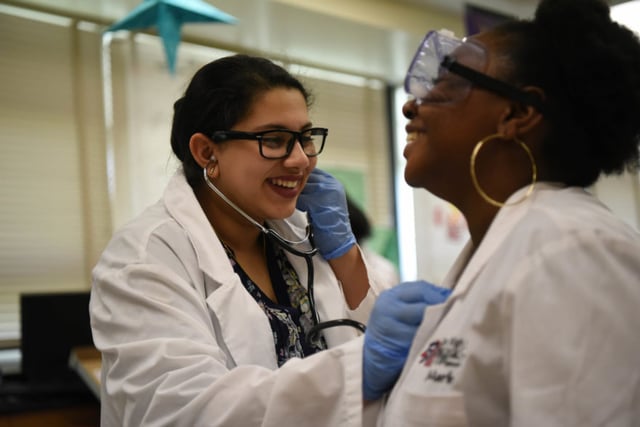
PLTW Provides Students Hands-On, Authentic Experiences

Position on Ethics in Science
PLTW students engage in hands-on activities, projects, and problems where they solve real-world challenges and are pushed to develop ethical reasoning skills. Students examine the impact of potential solutions and discuss topics that require them to consider ethical choices. The use of preserved specimens for dissection provides an avenue for teachers and students to engage in ethical reasoning. Students are encouraged to think about their personal views regarding the use of animal models in science.
They discuss differing opinions, work together to establish team norms for the proper treatment and respect for the specimens, and cultivate an appreciation and respect for life. Through these experiences, students develop specific personal and professional characteristics that lend themselves to the creative, collaborative, and solution-driven nature of the biomedical science profession. As students weigh the ethical implications of biomedical science decisions, they explore the larger ethical, moral, and legal issues related to scientific research, product development, and use in society.
Position on an Authentic Biomedical Science Experience
PLTW empowers students to make a difference in their classrooms, in their communities, and around the world. The PLTW experience thrives on hands-on engagement that allows students to step into the shoes of professionals and solve problems using tools and techniques they would see in the field. PLTW utilizes a combination of modalities—simulations, 3D models, and hands-on activities to elevate the student experience and support lasting understanding that can be applied to novel situations.
PLTW believes that animal dissections provide an authentic opportunity for students to develop an understanding of structure and function. Dissecting animal specimens is a hands-on experience that showcases three-dimensionally complex anatomical structure and relationships. Through this experience, students develop hand-eye coordination and spatial motor skills and are able to observe variation that is often not depicted in virtual experiences or simulations. While online simulations can cover the knowledge and theory skills related to a tool or process, they do not serve as a replacement for practical skills-based training.
In a time when we want to foster students who think about others and who accept differences, we need to train future biomedical professionals who care for patients in the most relevant way. Dissection provides an avenue to help students develop compassion and empathy, as students learn to handle preserved specimens with respect and dignity.
PLTW continues to leverage and support multiple modalities of gross anatomy exploration including modeling, simulation, and dissection. In alignment with NSTA (National Science Teaching Association), NABT (National Association of Biology Teachers), AAAS (American Association for the Advancement of Science), and HAPS (Human Anatomy and Physiology Society), PLTW supports the inclusion of dissection when educationally appropriate and encourages teachers to be responsive to student sensitivities regarding dissection. In addition, PLTW recognizes that all students may not want, or be able to, participate in dissections and provides options for alternate experiences. PLTW empowers students to advocate for the learning experience of their choice.
Position on the Procurement of Specimens
PLTW is committed to preparing students for lasting careers by making a difference in the classroom with hands-on and relevant experiences. PLTW believes that animal dissections provide an authentic opportunity for students to develop an understanding of structure and function. While dissection is included as a recommended part of our curriculum, we encourage teachers to provide alternatives and choice to all students, including synthetic and interactive 3D visualization options.
The US Department of Agriculture, under the Animal Welfare Act, governs the procurement of animals. PLTW has chosen vendors with outstanding USDA inspection and compliance records and are committed to, and practices, the humane treatment of animals. The preserved specimens used in PLTW curriculum programs are not raised specifically for dissection, they are byproducts of the food industry. PLTW routinely checks in with our vendors to ensure they remain in compliance with state and federal regulations.